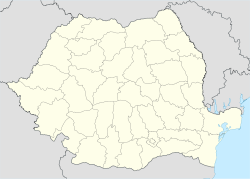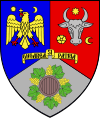Adjud
| Adjud | ||
|---|---|---|
| Municipality | ||
|
||
| Coordinates: Lua error in package.lua at line 80: module 'strict' not found. | ||
| Country | ||
| County | Vrancea County | |
| Status | Municipality | |
| Government | ||
| • Mayor | Constantin Armencea (Social Democratic Party) | |
| Area | ||
| • Total | 59.1 km2 (22.8 sq mi) | |
| Population (2011) | ||
| • Total | 14,670 | |
| Time zone | EET (UTC+2) | |
| • Summer (DST) | EEST (UTC+3) | |
| Website | www.adjud.ro | |
Adjud (Romanian pronunciation: [adˈʒud]; Hungarian: Egyedhalma) is a city in Vrancea County, Moldavia, Romania. It has a population of 14,670 inhabitants (2011). It lies at a railway junction which has a classification yard and a passenger station. Adjud, situated north of the point where the Trotuş River enters the Siret River, used to be a marketplace.
The city administers three villages: Adjudu Vechi, Burcioaia and Şişcani.
Geography
Adjud is situated on a plain and is surrounded by hills up to a height of 400 meters at the foot of the southern Carpathians. The average altitude of the town is 100 m above sea level. The surrounding land is favorable for agriculture.
Geological research findings show the city's subsoil having layers of gravel and sand Levantine and Quaternary, forming significant hydrological aquifers deposits fed by the Trotuş and Siret rivers and direct rainfalls.
The climate is temperate with annual average temperature of 8-10 °C (50 °F) and an average rainfall of 500 mm / m a year. It is characterized by prevailing northwinds with winds from the south and south-east in the hot season. Due to its location at the junction of the provinces Moldavia, Wallachia and Transylvania, it has been an important road and railway junction since ancient times. The town's area was of 5911 ha in 1997, out of which 105 ha was covered by buildings and yards.
History

In the northern part of the town a settlement from the Bronze Age was discovered which dates roughly to the second millennium BC and belongs to Monteoru culture. Geto-Dacian vestiges of 5th century BC were also found here.
The first mention of the town is made by its Hungarian name Egyedhalma (“in oppido nostro Egydhalm” meaning "in our city Gilles’ Hill") in a Latin language document from 1433[1] where Iliaş of Moldavia granted commercial privileges to Transylvanian Saxon merchants. The Romanian name derives from the Hungarian one. The original name supports the idea that the town was esteblished by Hungarian Csángós settled in Moldavia as part of a systematic Hungarian imperial policy to settle Hungarian and partly German population in places of strategic economic, commercial and military importance with the task to control and defend the eastern frontier of Hungary.[2][3] It was declared a city in 1948.
Population
| Historical population | ||
|---|---|---|
| Year | Pop. | ±% |
| 1930 | 6,748 | — |
| 1948 | 4,028 | −40.3% |
| 1956 | 6,119 | +51.9% |
| 1966 | 8,347 | +36.4% |
| 1977 | 12,501 | +49.8% |
| 1992 | 20,346 | +62.8% |
| 2002 | 20,776 | +2.1% |
| 2011 | 14,670 | −29.4% |
| Source: Census data | ||
According to the 2011 census, Adjud had a population of 14,670. The ethnic structure was:
As to religious makeup, most respondents were of the Orthodox religion (94.92%). The second largest community was the Roman Catholic one, 2.32% of the population. Pentecostals totalled 1.33% while other denominations were represented by less than 1%.
Road
Adjud municipality is crossed by the National road E 85 for a length of 11 km, from km 226 at the Trotuş Bridge up to 237 km to Bacău running in downtown for a section of 3 km. It is also crossed by the national road 11A, from the agro-food market towards Oneşti - Bacău, for a length of 4 km from km 37 + 450 to km 33 + 450. The national road E 85 branches out to Adjudu Vechi, while 11A goes to Bârlad, from km 42 to 46, for a length of 4 km running in the downtown area for a section of 1.5 km.
Notable persons
- Dan Botta (1907–1958), poet, essayist
- Emil Botta (1911–1977), poet, writer and actor, brother of Dan Botta
- George Balş (1868–1934), engineer and art historian
- Ion Dichiseanu (1933), actor
- Angela Gheorghiu (1965), soprano
- Nelly Miricioiu (1952), soprano
- Viorel Simion (1954), architect
References
External links
| Wikimedia Commons has media related to Adjud. |


